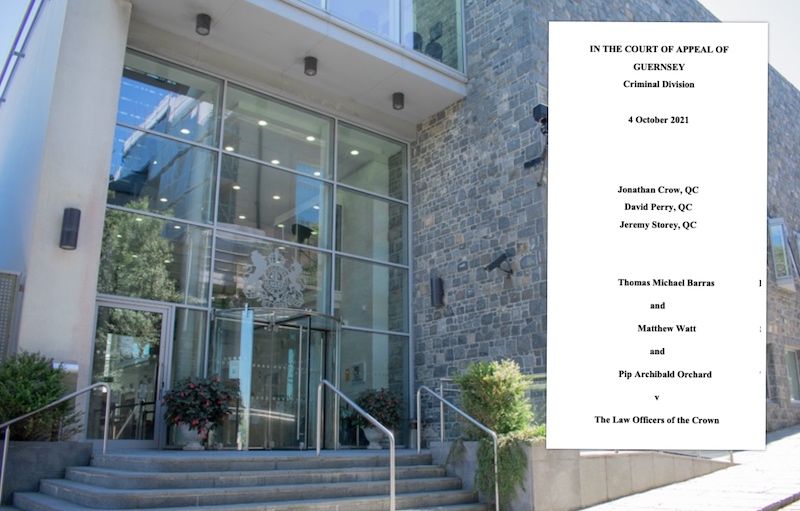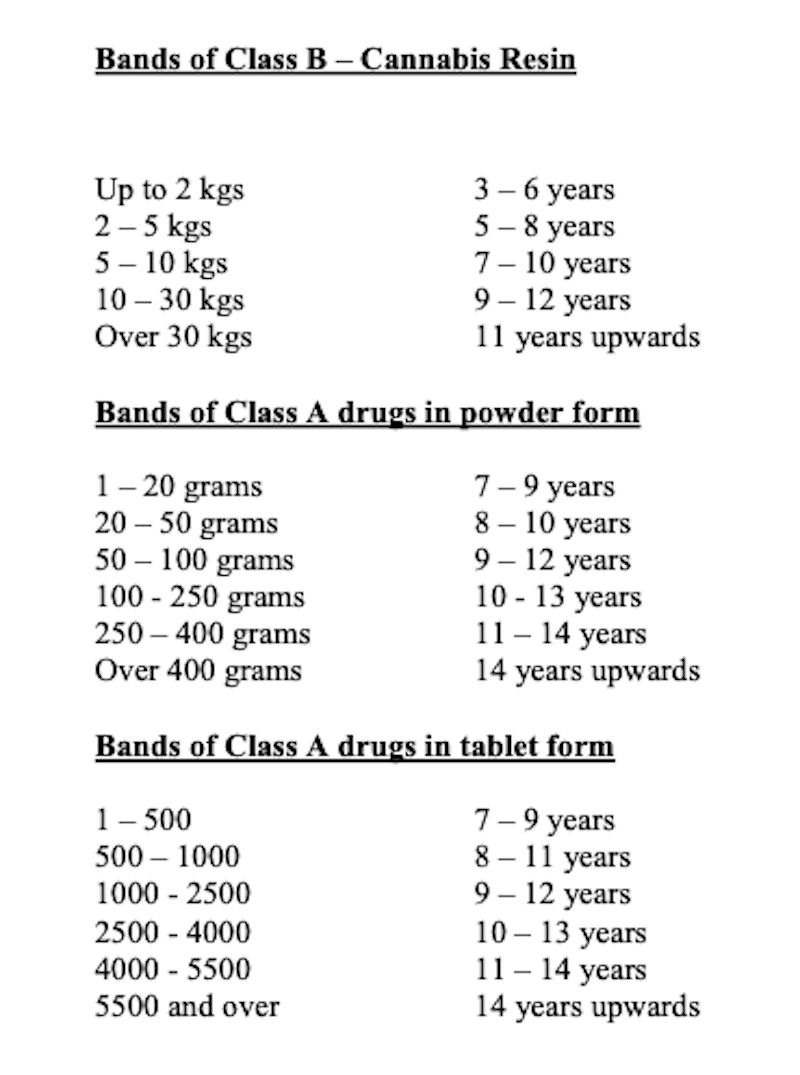


Claims that the Richards Guidelines are "outdated" have been dismissed by the Court of Appeal, which has thrown its weight behind Guernsey's sentencing regime, claiming it "continues to serve the Bailiwick well".
The high-profile appeal by Pip Orchard and two others, all of whom were sentenced in Guernsey's Royal Court, was dismissed in a significant judgment by three English QCs.
Thomas Barras (28) and Matthew Watt (43), both from Alderney, were sent to prison in May 2020 after they returned from a day trip to France with cannabis and cocaine.
Watt had taken Barras to France on board his Rib on 28 December 2019. When they arrived back at Alderney’s Commercial Quay, they were caught with 12.85g of the Class A drug and Barras had 19.22g of cannabis.
Barras received a five year, nine month sentence for importing cocaine and a concurrent 18 month sentence for importing cannabis.
Watt received a five year, six month sentence for importing cocaine and a consecutive eight month sentence for refusing to disclose his phone’s pin code to investigating officers, bringing his total sentence to six years, two months.
Meanwhile, Pip Orchard [30] was caught by border agency staff importing 2.95g of cocaine in August last year. While on bail in December, Orchard drove up Le Val de Terres on the wrong side of the road late at night while drunk, refusing to stop and leading a police officer on a frantic pursuit.
Orchard was sentenced to two years, six months for importing the cocaine and six months for dangerous driving, which his Advocate Sam Steel did not appeal against.

Pictured: The sentencing bands for drug supply and importation. A significant passage of the Richards judgment instructs that personal use should "not generally result in a lighter sentence" as all drugs, no matter how small the quantity, "add to the stock in the island".
For Barras, Advocate Claire Tee argued that the cocaine sentence was “manifestly excessive because the amount imported was not treated as being split equally between the two accused.”
The appeal was also founded on the belief that the Richards Guidelines should be reconsidered because they are “outdated”.
For Watt, Advocate Steel argued that his sentence did not adequately distinguish his case from that of his co-accused - who had a recent relevant conviction for drug trafficking in 2015 – and that insufficient credit was afforded to him for his guilty plea and personal mitigation, which included having a young child.
It was also contested that the eight-month sentence for the RIPL offence was manifestly excessive.

Pictured: Express has investigated and explained the background to the Richards Guidelines HERE.
On behalf of Orchard, Advocate Steel said that his client’s personal mitigation was substantial.
As well as his work as a paediatric nurse in Guernsey, Orchard had volunteered at refugee camps at Calais and Greece in 2017 and 2018, where he had some harrowing experiences.
This had led Orchard to addiction and Advocate Steel argued that the small quantity of drugs and the fact they were for personal use were not given due weight under the current sentencing guidelines.
The Defence Advocate also argued that Orchard had not received full credit for his previous “good character” and low risk of re-offending, as well as the five months he spent on remand pending sentence.
A previous appeal against Orchard’s sentence, announced on 1 July, was refused by the single judge (Clare Montgomery QC) who concluded that the total sentence of 3 years’ imprisonment was “entirely reasonable”. She concluded that the Royal Court had given “considerable credit for the applicant’s extensive personal mitigation.”
Orchard’s lawyer submitted a number of recent UK and EU reports into sentencing guidance, drug decriminalisation and policy reform.

Advocate Steel said the treatment of drug possession for personal use has changed considerably since Guernsey’s case law in this area was first set out.
“Richards was of course decided 21 years ago at a time when there was relative consistency throughout Western jurisdictions to the approach to sentence for drugs offences, with lengthy sentences for commercial supply or importation of large quantities of drugs and possession offences (whether as part of an importation or otherwise) being met with criminal sanction and sometimes involving short periods of imprisonment,” he said.
“However, over the last 20 years, although there has been little change in the approach to sentences for the supply/importation of large quantities of drugs, the position has changed considerably in respect of possession of small quantities of drugs as many countries have moved away from the use of criminal sanctions and custody in particular, and towards a more tolerant and progressive approach to offences for possession of drugs only.”
On behalf of the Law Officers, Crown Advocate Chris Dunford argued that the Richards guidelines “already provide a sufficiently flexible framework for sentencing in drug importation cases capable of reflecting individual circumstances and achieving fair and just sentences.”
He said the appellants had based their arguments on possession offences and argued that they “stray into issues of decriminalisation and penal policy” and “are inviting the Court of Appeal to go beyond its proper remit and address matters that are properly within the province of the States of Deliberation.”
In sentencing remarks for Barras and Watt, it was said that the Royal Court “must loyally follow the guidance provided by the Court of Appeal in the case of Richards and others”.
In Orchard’s case, Guernsey’s Bailiff similarly said that the Richards Guidelines were “binding” on the Royal Court.
In their judgment, Court of Appeal judges Jonathan Crow QC, David Perry QC and Jeremy Storey QC dismissed the criticism of the Richards Guidelines outright, saying it has been “overstated”.
“It is our clear view that the Richards guidelines contain sufficient flexibility to accommodate the mitigating circumstances that might arise in any particular case and experience shows this to be the case.
“While the decision of the Court of Appeal in Richards was handed down almost 20 years ago, we are not aware that it has caused difficulties in practice, nor are we aware that it has created injustice in particular cases.
“Given the emphasis placed by the Court on the discretion vested in the Royal Court, it is not surprising that the decision has stood the test of time. In our view, the decision in Richards is not out of date; it does not need to be revised, and it does not lead to sentences that are generally manifestly excessive.”
On the individual appeals, the Court of Appeal said the Royal Court had made clear - when sentencing Barras and Watt - that the importation of cocaine was a joint enterprise and that “each was liable for the acts of the other carried out in pursuance of that joint enterprise.”
“In our view, the reasoning is unimpeachable.”
The Court of Appeal dismissed Watt’s claims that his personal mitigation was not reflected in his sentence and that the RIPL charge was excessive.
They stated: “The court is entitled to assume that a refusal to [provide an encryption key] is designed to conceal evidence connected to the offences under investigation or some other form of serious criminality.”
For Orchard, the Court of Appeal judges said there is “no arguable basis“ for contesting the length of the sentence and that it relied on two unrelated sentencing decisions of the Royal Court where non-custodial sentences were imposed in 2017 and 2019.
“The decisions in Bucknall and Stewart are of no assistance to [Orchard]; they are decisions confined to their particular facts, establish no point of principle and serve to emphasise the truism of the Court’s observation in Richards: “Sentencing is always a matter for the court’s discretion. It is an art and not a science.”
They concluded: “In our view the Richards guidelines remain good law. We reject the argument that they are outdated and in need of revision. We agree with the submissions advanced on behalf of the Law Officers of the Crown that the guidelines are not to be read as an inflexible code and that they have served the Bailiwick well for almost two decades, and continue to do so.”
Comments
Comments on this story express the views of the commentator only, not Bailiwick Publishing. We are unable to guarantee the accuracy of any of those comments.